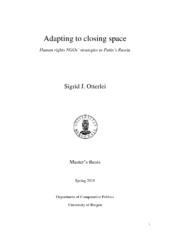Adapting to closing space: Human rights NGOs’ strategies in Putin’s Russia
Master thesis
Permanent lenke
https://hdl.handle.net/1956/17833Utgivelsesdato
2018-06-21Metadata
Vis full innførselSamlinger
Sammendrag
This thesis is concerned with investigating two phenomena related to civil society occurring in competitive authoritarian regimes: Closing space for civil society and deliberation in the form of limited pluralism. The study explores how Russian human rights NGOs perceive this mix and how they respond. While some level of pluralism in civil society is assumed to be necessary in order to cope with the institutional uncertainties that competitive authoritarian regimes experience, closing the space for civil society is equally called for in order to ensure the survival of a regime that is neither entirely democratic nor completely authoritarian. How do NGOs respond to the resulting dual framework? Although Russian human rights NGOs have been the targets of increasingly restrictive measures over the last fifteen years, they have nevertheless also been invited to take part in an increasing number of bodies tasked with consulting and monitoring. The thesis answers the research question: In what ways do Russian human rights NGOs respond to new restrictions, and why and how do they participate in co-optation efforts from the state? Twelve semistructured interviews have been conducted with the goal of contributing with new knowledge about what strategies NGOs develop to succeed in closing space. The thesis looks at new and less formal organizational forms, funding opportunities and prospects of building domestic support. It discusses what benefits NGOs gain from participating in consultative- and monitoring bodies and issues related to legitimacy with regard to participating.
